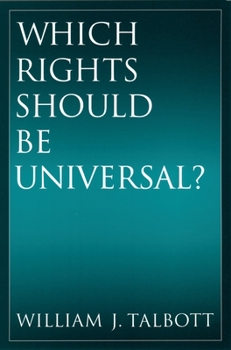Which Rights Should Be Universal?
Select Format
Select Condition 
Book Overview
"We hold these truths to be self-evident..." So begins the U.S. Declaration of Independence. What follows those words is a ringing endorsement of universal rights, but it is far from self-evident. Why did the authors claim that it was? William Talbott suggests that they were trapped by a presupposition of Enlightenment philosophy: That there was only one way to rationally justify universal truths, by proving them from self-evident premises. ...
Format:Paperback
Language:English
ISBN:0195331346
ISBN13:9780195331349
Release Date:June 2007
Publisher:Oxford University Press
Length:256 Pages
Weight:0.05 lbs.
Dimensions:0.7" x 6.1" x 9.1"
Customer Reviews
2 ratings
A thoughtful account
Published by Thriftbooks.com User , 14 years ago
Dr. Talbott's remarks on human rights balance philosophical concerns and the historical record adeptly. His emphasis on bottom-up processes for the devlopment of robust ethical conceptions yields some novel but well-grounded insights. I would recommend this book to anyone with a serious interest in ethics or social philosophy.
Good Book
Published by Thriftbooks.com User , 19 years ago
In this volume, Talbott argues that the practice of securing a broad range of human rights would dramatically increase the well-being of the world's citizens, present and future. Moreover, and more interestingly, he argues that this increase provides the underlying justification for such rights. His position is a novel addition to the contemporary scene, dominated by non-consequentialist approaches like those of Rawls. Talbott clearly and effectively challenges Rawls's position in The Law of Peoples and, on the way, offers fascinating historical illustrations of moral progress and the psychological mechanisms that sustain or inhibit it. His response to Richard Rorty in the last chapter is also worth reading, although I found it somewhat less convincing.





